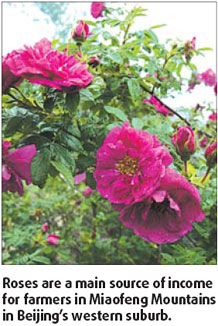

|
|
Holding a small bottle of rose otto, Li Jiyong, a farmer in suburban Beijing, marvels that the same hands that once carried buckets of manure have actually created this "liquid gold".
"Nothing is impossible if you devote yourself to it," says 46-year-old Li, who runs the Beijing Rose Valley Perfume Co Ltd.
Growing up in Mentougou in western Beijing, Li dropped out of school at 9 owing to poverty, and helped his parents with farm work. "Most of the time I had to collect droppings," Li recalls. Later, he learned driving, became a driver, and then a building contractor.
In 2003, Li happened to see a delicate bottle in the office of a manager of Diaoyutai Hotel, where he was working on a project. He was told that the liquid in that bottle was worth 168,000 yuan ($24,700).
"It was the first time I had heard about rose otto, the essential oil extracted from rose petals, and realized it was highly valued in the perfume business," says Li.
The incident reminded Li of his hometown near Miaofeng Mountains. With its highest peak at 1,300 m, the climate is highly conducive to growing mountain roses. In fact, the tradition goes back more than 1,000 years.
For generations, roses have been one of the major sources of income for local farmers, but an unstable market meant just 4,000 yuan ($588) per person a year, on average.
Li thought rose oil would make a promising business for local farmers and reckoned local incomes could be increased five-fold.
After consulting many experts, Li understood that the key to turning roses into oil for perfume was the distillation process.
But the road to wealth was not smooth.

In 2005, Li spent most of his savings on buying the distillation equipment from Hebei province and began to work on his ambitious project. He and his co-workers used leaves instead of petals for their experiments to save on costs, but this only produced poisonous gas that made them feel dizzy.
Villagers made fun of Li and taunted him saying if he could produce rose otto, they would give him all the roses they grew. But Li did not give up. He borrowed money from his friends to buy roses and continued his experiments.
Two months later, a strong fragrance wafted out of Li's lab. Holding a small bottle of rose oil, Li was delirious with joy.
Cooperating with the experts from Beijing Technology and Business University, Li's team got their rose otto approved by the national authority as a cosmetic product.
Li then founded his Mentougou Premium Rose Planting Association, and 76 rose-growing households joined. In order to expand the plantation area and meet the market demand, Li started to encourage peasants living in nearby Baihua Mountains to join his business.
To convince people that growing roses was more profitable than growing crops, Li offered more than 50 local peasants a free trip to Pingyin, a big rose planting base in Shandong province, in 2006.
The trip, which cost him 50,000 yuan ($7,300), paid rich dividends. The farmers were moved by Li's enthusiasm and got a better understanding of the rose oil industry. They agreed to join Li's business.
In 2007, Li faced another problem - shortage of workers. Each rose has to be picked before the petals open up. Since Li failed to find enough workers, several hundred roses dried overnight and Li lost 100,000 yuan ($14,700).
Though his wife urged him to give up the business, Li insisted that he would not break his promise to the villagers.
His determination and the support of the other farmers helped Li survive these ups and downs.
After years of efforts, he has succeeded in expanding his business into a large company, which produces a number of famed cosmetic products, with an annual output of more than 400 tons.
"It takes 5 tons of rose petals to distill into one kilo of essential oil. To reduce costs, some dishonest dealers will dilute rose oil with other materials which are rich in geraniol, the main constituent of rose oil. Some of these 'rose oils' are up to 90 percent geranium or palmarosa and only 10 percent rose," says Li. His experience in the business has converted him into a cosmetic consultant.
He now has two bamboo houses in his rose plantation, offering visitors rose petal showers.
"If Provence can convert its lavender plantation into a resort, why can't we convert our rose plantation too?" asks this ambitious entrepreneur.
(China Daily 09/16/2008 page19)